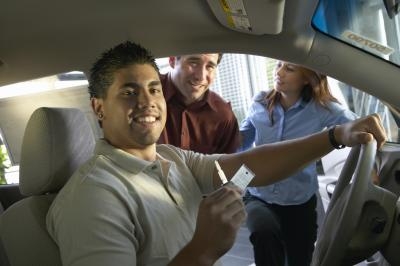
A used car that looks perfect on the outside could have mechanical flaws. You can uncover these problems by hiring a mechanic to do a pre-purchase inspection. A professional can alert you to potential issues before you buy the car. The cost of an inspection as of June 2011, is about $100 to $200, according to the J. D. Power consumer satisfaction survey company; however, you could save much more by avoiding repair bills.
The car repair industry has no standardized set of guidelines for used car pre-purchase inspections, but mechanics routinely inspect components under the hood, such as the engine, radiator and belts. A basic inspection also involves elevating the car on a hydraulic lift and visually checking the undercarriage for broken components and fluid leaks, according to J. D. Power. The mechanic can also remove the tires and check the condition of the brakes.
A mechanic can assess a vehicle more thoroughly by test driving it. This more in-depth inspection involves checking the car's ability to accelerate, engine smoothness, steering, shifting and braking. An experienced mechanic may pick up on subtle sounds that could indicate hidden problems while driving the car and check those areas more thoroughly after the test drive. The odometer should also be observed for signs of tampering.
The most in-depth pre-purchase inspections involve the mechanic hooking the car up to a computerized diagnostic machine, in addition to the manual inspection and test drive. Automated systems test for indicators such as engine compression, which cannot be assessed with a visual check.
Use a mechanic independent of the dealership or private seller from whom you plan to buy the car. Ask your usual mechanic to do the pre-purchase inspection, or ask your friends for recommendations if you do not know someone yourself. Make sure you are using a certified mechanic who regularly works with the make and model vehicle you want inspected, J. D. Power advises.
You can check many things yourself when narrowing down the list of cars that interest you before hiring a mechanic to check them. Always start with a cold car when doing a test drive to see if the vehicle is hard to start or hesitates when you initially drive it, the Tips4carbuying website advises. Drive the car with the radio off to help you notice any odd sounds. Observe whether the car steers and stops smoothly, and try both the air conditioner and heater. Notice where the vehicle has excessive interior wear -- on the seats, pedals or anywhere else. Park in a different spot after your test drive and check the car's original spot for any leak signs. Ask the buyer to show you the vehicle's maintenance records, the FTC recommends.